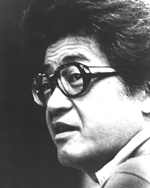A Quote by Seung Sahn
Meditation means keeping one mind. You must understand - what is life? What is death? If you keep one mind, there is no life, no death. Then if you die tomorrow, no problem; if you die in five minutes, no problem.
Related Quotes
Suicide is an escape from life. What is life? An escape from death. This means that each of us must die twice. There is the death waiting for us ahead, and the death that comes pursuing from behind.... Once you are free at least from the death that comes pursuing you, you can relax and enjoy life as you go along.
We are left with nothing but death, the irreducible fact of our own mortality. Death after a long illness we can accept with resignation. Even accidental death we can ascribe to fate. But for a man to die of no apparent cause, for a man to die simply because he is a man, brings us so close to the invisible boundary between life and death that we no longer know which side we are on. Life becomes death, and it is as if this death has owned this life all along. Death without warning. Which is to say: life stops. And it can stop at any moment.
Of this I am certain, that no one has ever died who was not destined to die some time. Now the end of life puts the longest life on a par with the shortest... And of what consequence is it what kind of death puts an end to life, since he who has died once is not forced to go through the same ordeal a second time? They, then, who are destined to die, need not be careful to inquire what death they are to die, but into what place death will usher them.
What if it is for life's sake that we must die? In truth we are not individuals; and it is because we think ourselves such that death seems unforgivable. We are temporary organs of the race, cells in the body of life; we die and drop away that life may remain young and strong. If we were to live forever, growth would be stifled, and youth would find no room on earth. Death, like style, is the removal of rubbish, the circumcision of the superfluous. In the midst of death life renews itself immortally.
I do not know if you have ever noticed that the more you struggle to understand, the less you understand any problem. But, the moment you cease to struggle and let the problem tell you the whole story, give all its significance - then there is understanding, which means, obviously, that to understand, the mind must be quiet.
So to be sick unto death is, not to be able to die-yet not as though there were hope of life; no, the hopelessness in this case is that even the last hope, death, is not available. When death is the greatest danger, one hopes for life; but when one becomes acquainted with an even more dreadful danger, one hopes for death. So when the danger is so great that death has become one's hope, despair is the disconsolateness of not being able to die.
Find out what it means to die - not physically, that's inevitable - but to die to everything that is known, to die to your family, to your attachments, to all the things that you have accumulated, the known, the known pleasures, the known fears. Die to that every minute and you will see what it means to die so that the mind is made fresh, young, and therefore innocent, so that there is incarnation not in a next life, but the next day.
We cannot hope to die peacefully if our lives have been full of violence, or if our minds have mostly been agitated by emotions like anger, attachment, or fear. So if we wish to die well, we must learn how to live well: Hoping for a peaceful death, we must cultivate peace in our mind, and in our way of life.
Death can come at any moment. You could die this afternoon; you could die tomorrow morning; you could die on your way to work; you could die in your sleep. Most of us try to avoid the sense that death can come at any time, but its timing is unknown to us. Can we live each day as if it were our last? Can we relate to one another as if there were no tomorrow?





































